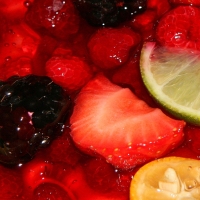GHI webinar: Nutritional Opportunities Today
Date: 25 May 2022, Time: 12 noon CEST

Duration: 1,5 hours
Abstract:
This webinar in the GHI webinar series, is hosted by the GHI Nutrition Working Group and is intended to present to the general public and potential stakeholders its mission regarding the global harmonization of nutrition legislation together with a focus on a few specific topics that are of current interest: front of pack nutritional labelling, spices as antioxidants, and the functional benefits of the fermented tea beverage - kombucha.
The mission of the GHI Nutrition Working Group is to strive for evidence-based global harmonization of nutrition regulations and legislation. Its goal is to publish a nutrition white paper that discusses global, consistent nutrition policy with an action plan on nutrition and recommendations for harmonization of dietary guidance. The GHI Nutrition Working Group is open to new members and to collaborations with global organizations involved in scientific research with the potential to impact the harmonization of nutrition legislation.
This GHI webinar and interactive sessions, will be expertly chaired by Dr. Diana Bogueva, GHI Working Groups Director.
Front-of-pack nutrition labelling: principles, global context and application in foodservice
Dr. Iuliana Vintila, is an Associate Professor of Food Science and Engineering at “Dunarea de Jos” University of Galati, Romania.
Abstract:
Nutrition labelling needs to serve the final consumer in daily food selection towards healthier choices for particular age, gender, health status, preferences, eating habits etc. In particular, the front-of-pack labelling needs to boost the global food industry towards the direction of most favorable food composition by suitable food production systems and tailored food formulations. The European Commission focus is about nutrients of reference for public health, energy & nutritional food profiling. This being supported by labelling tools to help the EU population in making healthy & diet suitable choices and nutrient profiles to be considered by EU food producers.
The harmonization of the front-of-pack labelling is particularly difficult because of different complementary EU nutritional labelling, mandatory ( Regulation EU No 1169/2011 ) or voluntary (Nutriscore, for example). In reaching the consensus on the optimal EU harmonized mandatory front-of-pack nutrition labelling systems, the Global Harmonization Initiative (GHI) Nutrition Working Group endeavours to support the European Food Safety Authority (EFSA) in providing a science-based opinion and calls on individual scientific and worldwide organizations, interested in this issue, to join us in order to offer the better solution for the final consumer and international food producers, traders and policy-makers.
Spices as an alternative of synthetic antioxidants
Dr. Sunita Singh, is an Assistant Professor of Chemistry in the Navyug Kanya Mahavidyalaya, University of Lucknow, India
Abstract:
Since antiquity spices have been utilized for their flavoring and preservative properties. They have acquired a special mention in various traditional medicine system around the world. With the advancement in scientific tools and technologies, they have gained a special attention from scientific community, pharmaceutical and food industries because of their potential use for improving health. In vitro and in vivo studies have demonstrated how these substances can act as antioxidants, digestive stimulants, hypolipidemics and showed also antibacterial, anti-inflammatory, antiviral, and anticancerous activities. Among these, the antioxidant properties of a few specific spices have far-reaching nutraceutical values. Nowadays oxidative stress caused at cellular levels are responsible for various diseases or which antioxidants compounds plays a very important role in defense mechanism against these damages. Use of synthetic antioxidants are restricted due to the recent reports related to their side effects. In the present circumstances and consumers shift towards green consumerism, spices are emerging as potential alternatives of synthetic antioxidants.
The functional properties of kombucha
Dr. Viduranga Waisundara, is the Deputy Principal of the Australian College of Business & Technology, Kandy Campus, Sri Lanka
Abstract:
The kombucha beverage is produced by the fermentation of tea and sugar by a symbiotic association of bacteria and yeasts – primarily acetic acid bacteria and osmophilic yeast. These microbes collectively form a ‘tea fungus’, which is a name given because of the mushroom-like biofilm appearing in the fermented broth. The yeasts convert sugar added to tea into organic acids and ethanol. The enzymes, bacterial acids, and other secondary metabolites produced by the microbes impart the functional properties to the beverage. Typically, black or green tea can be used as the medium of fermentation and the period of incubation may vary from a few days up to 2 weeks. The kombucha broth can be bottled for commercialization once the fermentation process is complete. The beverage can be easily prepared in households as well, given that the ingredients required for the production are simply tea, sugar and water. Once the biofilm is formed, it can be extracted / removed and applied into other types of liquid media as well. It has been used to ferment coffee and coconut water (Cocos nucifera var. aurantiaca) resulting in two novel functional beverages of different flavor and taste. Recent studies have applied the biofilm to ferment fruit extracts as well and the substrates which have been used in the Kombucha biofilm-based fermentation process gets innovative every day. Overall, the kombucha beverage has demonstrated versatility and flexibility applied in various conditions and fermentation media, which has resulted in the development of novel beverages with varied disease preventive effects. Many of these can be seen in the current product market and consumers in several countries and regions have identified kombucha as a go-to functional beverage for obtaining bioactives to promote health and wellnesss.
Speaker 1:
Dr. Iuliana Vintila
 Dr. Iuliana Vintila is an Associate Professor of Food Science and Engineering at “Dunarea de Jos” University of Galati, Romania. She is author of 22 books and book chapters in international and national publishing houses (Elsevier, Wiley, Lambert), first author and co-author for 14 articles in ISI journals and relevant ISI proceedings, 26 BDI scientific papers indexed in recognised international databases, 43 articles presented in national and international conferences and 23 article reviews. Also, she is a member of prestigious international organisations including European Federation of Food Science and Technology (2009), Co-Chair WG Nutrition in Global Harmonization Initiative (since 2013), International Society of Food Engineering (2010), Balkan Environmental Association (2008), Global Environmental Standard (GES) Community of Interest (2011), European Academy for Education and Social Research (2012). Dr. Iuliana Vintila also acts as international projects expert for European Science Foundation, Eurostar Programme, EC « Expert area in the Participant Portal » and « Connecting Europe Facility », EU TAIEX, COST, EACEA, Erasmus Mundus(2010). She is Guest Associate Editor and Research Topic Editor for “Frontiers in food science and technology”, Regional Editor “Advance Journal of Food Science and Technology”, Academic Editor European Journal of Nutrition & Food Safety, Editorial Board Member SciEdTech, Editorial Board Member African Journal of Water Conservation and Sustainability, Editorial Board Member International Scholar Journals, etc.
Dr. Iuliana Vintila is an Associate Professor of Food Science and Engineering at “Dunarea de Jos” University of Galati, Romania. She is author of 22 books and book chapters in international and national publishing houses (Elsevier, Wiley, Lambert), first author and co-author for 14 articles in ISI journals and relevant ISI proceedings, 26 BDI scientific papers indexed in recognised international databases, 43 articles presented in national and international conferences and 23 article reviews. Also, she is a member of prestigious international organisations including European Federation of Food Science and Technology (2009), Co-Chair WG Nutrition in Global Harmonization Initiative (since 2013), International Society of Food Engineering (2010), Balkan Environmental Association (2008), Global Environmental Standard (GES) Community of Interest (2011), European Academy for Education and Social Research (2012). Dr. Iuliana Vintila also acts as international projects expert for European Science Foundation, Eurostar Programme, EC « Expert area in the Participant Portal » and « Connecting Europe Facility », EU TAIEX, COST, EACEA, Erasmus Mundus(2010). She is Guest Associate Editor and Research Topic Editor for “Frontiers in food science and technology”, Regional Editor “Advance Journal of Food Science and Technology”, Academic Editor European Journal of Nutrition & Food Safety, Editorial Board Member SciEdTech, Editorial Board Member African Journal of Water Conservation and Sustainability, Editorial Board Member International Scholar Journals, etc.
Speaker 2:
Dr. Sunita Singh
 Dr. Sunita Singh is an Assistant Professor of Chemistry in the Navyug Kanya Mahavidyalaya, University of Lucknow, India, since 2019. She was awarded her Ph.D. in 2015 on the topic, “Chemistry, antioxidant and antimicrobial activities of essential oils and oleoresins of spices” from DDU Gorakhpur University, Gorakhpur. She was awarded junior research and senior research fellowships from the University Grant Commission. Her work was mainly focused on quantitative and qualitative analyses of essential oils and oleoresins of spices namely Piper nigrum, Nigella sativa, Mentha longifolia, Anethum graveolans, Brassica juncea and Sinapis alba. Chemistry, antioxidant and antimicrobial efficacies of essential oil and oleoresins were investigated using different techniques. She has published 19 research articles in journals of National and International repute. She has authored and coauthored 8 book chapters with national and International publishing house. She has edited a book titled, “Volatile oils: Production, Composition and Uses” with Nova publishers. She has presented her work at various global events. She is also an active member of Association of Chemistry Teachers (India), International Community Aromatherapy Network and Global Harmonization Initiative.
Dr. Sunita Singh is an Assistant Professor of Chemistry in the Navyug Kanya Mahavidyalaya, University of Lucknow, India, since 2019. She was awarded her Ph.D. in 2015 on the topic, “Chemistry, antioxidant and antimicrobial activities of essential oils and oleoresins of spices” from DDU Gorakhpur University, Gorakhpur. She was awarded junior research and senior research fellowships from the University Grant Commission. Her work was mainly focused on quantitative and qualitative analyses of essential oils and oleoresins of spices namely Piper nigrum, Nigella sativa, Mentha longifolia, Anethum graveolans, Brassica juncea and Sinapis alba. Chemistry, antioxidant and antimicrobial efficacies of essential oil and oleoresins were investigated using different techniques. She has published 19 research articles in journals of National and International repute. She has authored and coauthored 8 book chapters with national and International publishing house. She has edited a book titled, “Volatile oils: Production, Composition and Uses” with Nova publishers. She has presented her work at various global events. She is also an active member of Association of Chemistry Teachers (India), International Community Aromatherapy Network and Global Harmonization Initiative.
Speaker 3:
Dr. Viduranga Waisundara
 Dr. Viduranga Waisundara , obtained her Ph.D. in Food Science and Technology from the Department of Chemistry, the National University of Singapore in 2010. She was a lecturer at Temasek Polytechnic (TP), Singapore from July 2009 to March 2013. She relocated to her motherland Sri Lanka and spearheaded the Functional Food Product Development Project at the National Institute of Fundamental Studies from April 2013 to October 2016. She was a senior lecturer on a temporary basis at the Department of Food Technology, Faculty of Technology, Rajarata University of Sri Lanka. She is currently the deputy principal of the Australian College of Business and Technology, Kandy Campus, Kandy, Sri Lanka. She is also the Global Harmonization Initiative (GHI) Ambassador to Sri Lanka.
Dr. Viduranga Waisundara , obtained her Ph.D. in Food Science and Technology from the Department of Chemistry, the National University of Singapore in 2010. She was a lecturer at Temasek Polytechnic (TP), Singapore from July 2009 to March 2013. She relocated to her motherland Sri Lanka and spearheaded the Functional Food Product Development Project at the National Institute of Fundamental Studies from April 2013 to October 2016. She was a senior lecturer on a temporary basis at the Department of Food Technology, Faculty of Technology, Rajarata University of Sri Lanka. She is currently the deputy principal of the Australian College of Business and Technology, Kandy Campus, Kandy, Sri Lanka. She is also the Global Harmonization Initiative (GHI) Ambassador to Sri Lanka.
Chair & Event Moderator:
Dr. Diana Bogueva
 Dr. Diana Bogueva, GHI Working Groups Director is a social scientist with interests in sustainable food consumption, alternative proteins, consumer perception of novel food processing technologies and generational consumer behaviour, food sustainability and harmonization. Diana’s work has won three awards: the Australian National Best Book winner in 2019 and the World’s Best Book award 2020 in the Vegetarian book category at the prestigious 24th and 25th Gourmand Awards, considered equivalent to the Oscars in the area of food books, for her co-edited book ‘Environmental, Health and Business Opportunities in the New Meat Alternatives Market’. She also won the 2020 Faculty of Humanities Journal Article of the Year Award at Curtin University for their co-authored paper “Planetary Health and reduction in meat consumption”, which was at the top 5% of all world research outputs scored by Altmetrics. Diana is also a finalist in the 10th International Book Award at America’s Book Fair 2019 for her co-edited book ‘Handbook of Research on Social marketing and its influence on animal origin food product consumption’.
Dr. Diana Bogueva, GHI Working Groups Director is a social scientist with interests in sustainable food consumption, alternative proteins, consumer perception of novel food processing technologies and generational consumer behaviour, food sustainability and harmonization. Diana’s work has won three awards: the Australian National Best Book winner in 2019 and the World’s Best Book award 2020 in the Vegetarian book category at the prestigious 24th and 25th Gourmand Awards, considered equivalent to the Oscars in the area of food books, for her co-edited book ‘Environmental, Health and Business Opportunities in the New Meat Alternatives Market’. She also won the 2020 Faculty of Humanities Journal Article of the Year Award at Curtin University for their co-authored paper “Planetary Health and reduction in meat consumption”, which was at the top 5% of all world research outputs scored by Altmetrics. Diana is also a finalist in the 10th International Book Award at America’s Book Fair 2019 for her co-edited book ‘Handbook of Research on Social marketing and its influence on animal origin food product consumption’.
